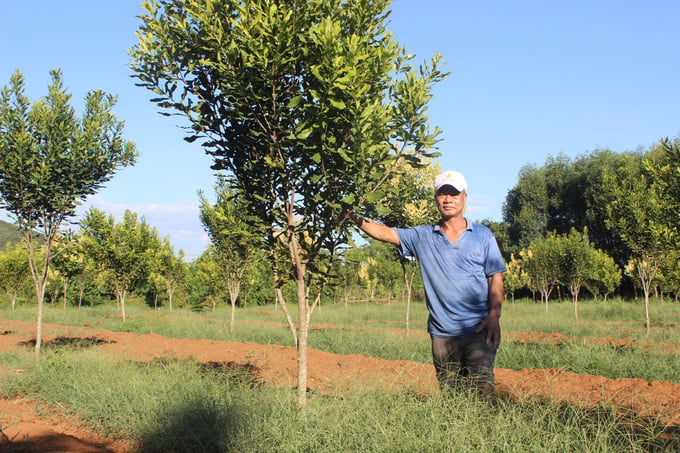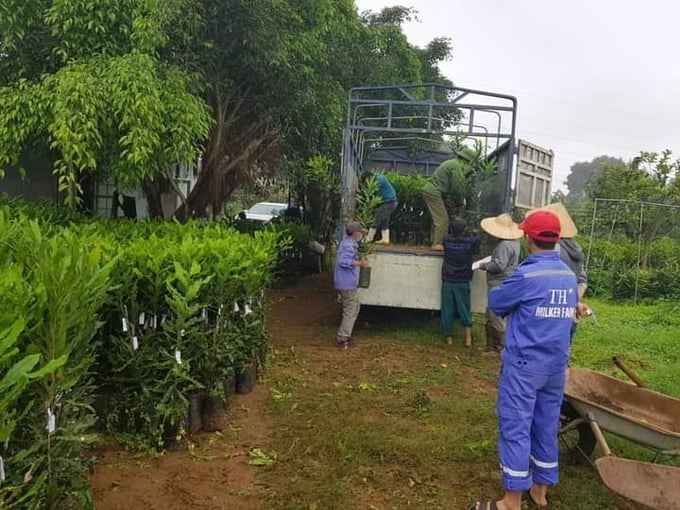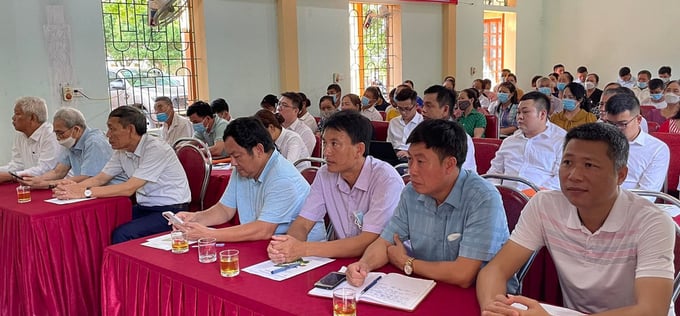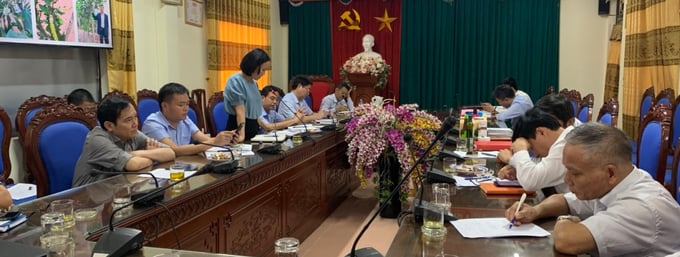June 16, 2025 | 15:04 GMT +7
June 16, 2025 | 15:04 GMT +7
Hotline: 0913.378.918
June 16, 2025 | 15:04 GMT +7
Hotline: 0913.378.918
Publisher's Note:
Macadamia is a prospective tree for the consumer market, as it has a high economic value in suitable planting areas and a high yield. However, this species of tree requires cautious soil, climate, and variety requirements, among others. Therefore, not all locations are suitable for macadamia cultivation; producers must exercise caution.
When communal and district authorities in Nghe An had no idea where to survey and assess the current situation of macadamia trees, enterprises and the Vietnam Macadamia Association (VMA) dispatched representatives to rural areas of Nghe An to conduct workshops recommending farmers to cultivate macadamia.
Realizing that the long-cultivated macadamia trees have produced fruit, VMA decided to create a film for communication purposes. The association also requested permission from local authorities to initiate a workshop to recommend macadamia producers.

The 2-year-old macadamia garden of Mr. Hoang Van Khuyen in Minh Lam village, Nghia Lam commune (Nghia Dan district). Photo: Ho Quang.
Mr. Duong Tien Thanh, Director of Bao Ngoc Company and Chairman of Nghe An Macadamia Branch, stated that all cuttings come from the best varieties of Him Lam Macadamia (Lam Dong) and the Center for Experimental and Transfer of Forest Tree Varieties (under the Vietnam Forestry Biotechnology and Seed Research Institute). The Ministry of Agriculture and Rural Development has acknowledged and licensed these premier macadamia trees.
During the seminars, Bao Ngoc Company made the following commitment: Farmers who purchase Macadamia varieties from the company will receive 50% of the company's microorganic fertilizer and free transport of seedlings to the planting site. For farmers whose seedlings fail to bear fruit after five years of planting, the company will compensate them 12 times the amount of seeds they purchased.
In addition, the corporation agreed to insure all macadamia fruits for a period of 10 years at 85% of the purchase price in Australia at that time.

Every year, Bao Ngoc Company exports about 40,000 macadamia seedlings to growers.
Bao Ngoc Company exports 40,000 seed containers annually. Since 2021, localities in Nghe An have planted more than 300 ha of macadamia, including 70ha in Quy Hop, 50 ha in Nghia Dan, and 30ha in Quynh Luu.
When the farmers received the company's seedlings, the technical team visited each garden to instruct everyone on how to care for plants at each growth stage.

Dissemination workshop on macadamia development organized by Nghe An Macadamia Branch in Nghia Duc commune, Nghia Dan district.
Currently, land resources, particularly forest land in western Nghe An, are abundant, but people only know how to cultivate acacia trees, resulting in a 6-7 year cycle income of approximately 100 million VND/ha. 1 ha of land requires a substantial investment of time and money but only yields 15 to 16 million dong annually, which is insufficient. However, producers continue to struggle because they do not know what to cultivate to make a breakthrough.
When I learned that plant cultivation is relatively new in Nghe An and that it is "marketed" as having high economic efficacy and the ability to make money, everyone became very enthusiastic.
In order to develop the macadamia tree in Nghe An, the Vietnam Macadamia Association recently held seminars at the People's Committee of Nghia Dan district and the Department of Agriculture and Rural Development of Nghe An province, as well as workshops in Yen Hop communes (Quy Hop district); Nghia Lac, Nghia Lam, Nghia Duc (Nghia Dan district), etc.

Nghe An Department of Agriculture and Rural Development discussed and exchanged with the Vietnam Macadamia Association about the development of macadamia trees on Nghe An soil.
During a meeting on 15 June 2022 between the Vietnam Macadamia Association and the Nghe An Department of Agriculture and Rural Development, Ms. Vo Thi Nhung - Deputy Director of the Nghe An Department of Agriculture and Rural Development - stated that the province's agricultural sector has not assessed the potential, benefits, and efficiency of macadamia plantations in the province. Therefore, in the near future, the Nghe An Department of Agriculture and Rural Development and associated departments will collaborate with the Vietnam Macadamia Association to conduct a comprehensive review and reevaluation of the planting area planning and breeding work.
According to Ms. Nhung, the development policy for macadamia trees in Nghe An is still in the planning stages. When will a plan be implemented? People continue to cultivate macadamia nuts despite the absence of planning and official guidance.
Surprisingly, when the author of this article visited several localities in Nghe An, none of the commune and district chairpersons knew how many households cultivate macadamia in their management area, nor did they know the number of households that grew macadamia in prior years.
Mr. Quy Hop District Vice President, Mr. Quan Vi Giang stated that the old macadamia tree in Quy Hop does not exist, but if it does, it is of little value, and the locals have cut it down to establish other trees because it is ineffective.
"So, what about the new planting area?" I replied. Mr. Hop stated, "People have scattered plantings in a spontaneous manner, but the district has not yet been oriented to cultivate macadamia".
Similarly, in the Nghia Dan district, where the authorities knew that many people grew macadamia nuts, they informed the communes that they had no orientation.
"Macadamia is not a primary tree in the province; it is experimental at this time. Regarding macadamia cultivation, neither the Department nor the province have taken any action or issued any documents. As for the planted macadamia acreage, we will continue to invest in its development and create policies if we see results, but scientists must have a precise assessment of geology, soil, and outcomes", Mr. Nguyen Thanh Vinh, director of the Nghe An Department of Agriculture and Rural Development, stated that re-planning, not improvisation, would occur based on the management's directives.
Translated by Linh Linh
![Turning wind and rain into action: [4] Bringing climate bulletins to remote and isolated areas](https://t.ex-cdn.com/nongnghiepmoitruong.vn/608w/files/linhnhp/2025/06/14/1152-z6704423696987_15fd32ffc26d590d204d520c9dac6786-nongnghiep-151141.jpg)
(VAN) The Vietnam Agriculture and Nature Newspaper interviewed Mr. Vu Thai Truong, Acting Head of Climate Change and Environment at UNDP Vietnam, to gain deeper insight into how climate bulletins are delivered to farmers.

(VAN) In Tien Giang, a high-tech shrimp farm has developed a distinctive energy-saving farming model that has yielded promising results.
![Turning wind and rain into action: [3] 300.000 farmers benefit from agro-climatic bulletins](https://t.ex-cdn.com/nongnghiepmoitruong.vn/608w/files/news/2025/06/12/e5a48259d6a262fc3bb3-nongnghiep-125122.jpg)
(VAN) The agro-climatic bulletin has become a valuable tool for farmers in the Mekong Delta. After more than five years of implementation, the initiative is gradually being expanded nationwide.
![Turning wind and rain into action: [2] Providing forecasts to the people](https://t.ex-cdn.com/nongnghiepmoitruong.vn/608w/files/news/2025/06/12/e5a48259d6a262fc3bb3-nongnghiep-103927.jpg)
(VAN) In addition to improving the quality of hydrometeorological forecasts, putting forecast bulletins into practical use is crucial for production and disaster prevention.

(VAN) Blue carbon is receiving attention for its rapid absorption capacity and vast potential. It represents a promising nature-based solution to respond to climate change.
/2025/06/11/3507-1-161904_583.jpg)
(VAN) Seagrass beds and coral reefs serve as 'cradles' that nurture life in the ocean depths, creating rich aquatic resources in Vietnamese waters.
![Turning wind and rain into action: [1] Forecasting for farmers](https://t.ex-cdn.com/nongnghiepmoitruong.vn/608w/files/news/2025/06/11/e5a48259d6a262fc3bb3-nongnghiep-111919.jpg)
(VAN) Weather is no longer just a matter of fate. Forecasts have now become an essential companion for farmers in every crop season.